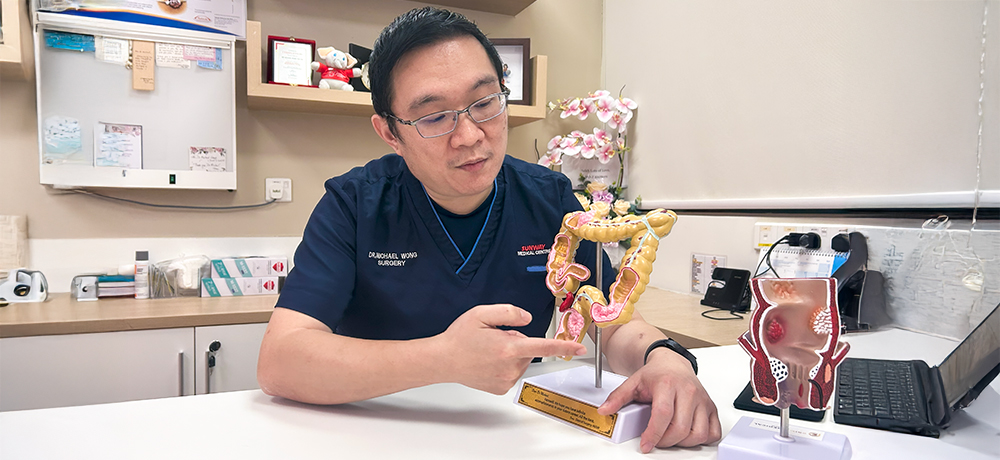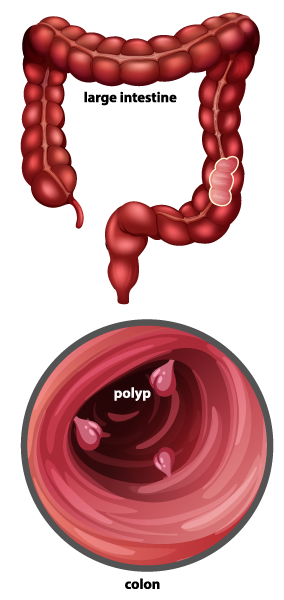结直肠癌:您需要了解的内容,Michael Wong 医生为您讲解
26 June 2025

你可能认为自己还太年轻,不会得结直肠癌。
但事实是:如今,越来越多的年轻成年人被诊断出患有结直肠癌。
最可怕的是?在早期阶段,可能根本没有任何症状,或者症状轻微到你根本不会察觉。
在这篇文章中,我们的普通外科与结直肠外科 Michael Wong 医生将为大家讲解结直肠癌的症状,以及你需要了解的相关信息。

什么是结直肠癌?
结直肠癌通常始于结肠中的小肿物,称为“息肉”。大多数息肉是良性的,但很难判断哪些可能会癌变。大约90%的结直肠癌都是由未处理的息肉在10到15年间逐渐演变而成。
如果能及早发现,癌变可能还仅限于息肉的表面。此时将息肉连根切除就能完全清除癌细胞,无需进一步治疗。这也是为何早期筛查至关重要。
通常,等到癌症扩散或变大后才会出现症状。需要警惕的迹象包括:
- 不明原因的贫血(皮肤苍白、疲倦、虚弱)
- 大便中带有黏液
- 不明原因的直肠出血
- 粪便中混有血丝
- 排便习惯改变(便秘或腹泻)
- 腹部不适
黄医生还指出了一个常见的误解——很多人认为直肠出血一定是痔疮引起的。其实不然,这也可能是结直肠癌的警讯。
如果你发现有这种症状,请不要拖延。应尽快就医并接受检查。
结直肠癌筛查
如果你没有任何症状,黄医生建议从50岁开始,每年进行一次结直肠癌筛查。
目前主要有两种筛查方式:
- 粪便潜血检测(FOBT):检测粪便中是否含有隐藏的血液。
- 粪便DNA检测(M2-PK):检测粪便中肿瘤标志物的升高水平,以判断是否可能患癌。
如果任一项检测结果呈阳性,下一步应进行结肠镜检查,也就是通过一个带摄像头的细小软管检查大肠内壁是否存在异常。
即使你没有做筛查测试,如果出现了结直肠癌症状,医生也可能会建议你直接做结肠镜检查。这种情况下,结肠镜用于诊断,而不是筛查。
黄医生补充,还有一种无创选项是CT虚拟结肠造影,通过特殊的CT扫描虚拟观察结肠内部,而无需使用结肠镜。不过,如果发现肿瘤,仍需进一步进行结肠镜检查及活检。
谁是结直肠癌的高风险人群?
根据黄医生的说法,以下人群属于结直肠癌高风险群体:
- 有结直肠癌家族史者
- 肥胖者
- 吸烟者
- 有饮酒习惯者
- 患有炎症性肠病者
- 经常食用加工食品、红肉或烧烤类食物者
趁早检查可以挽救生命
结直肠癌如果早发现,是可以治疗甚至治愈的。
早期发现的小病变,仅需手术切除即可。对于较严重的病例,可通过开放手术或微创方式进行广泛切除。
如果合适,机器人结直肠手术也是一种安全且精准的治疗选择。该手术采用更小的“钥匙孔”切口,术后疼痛更少,恢复更快,更早恢复日常生活。
黄医生表示:“我的一些病人,在进行机器人手术后,仅三天就顺利出院,没有任何疼痛或并发症。”
如果你已年满50岁、有症状,或属于高风险人群,请不要等待。立即与我们的结直肠外科医生联系,进行咨询。






